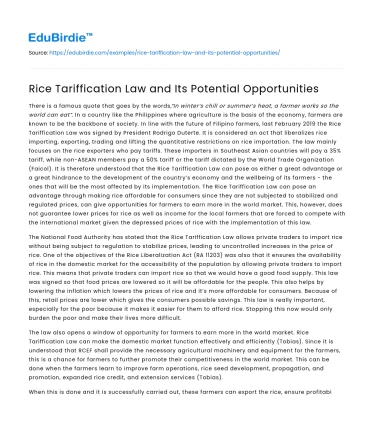There is a famous quote that goes by the words, “In winter’s chill or summer’s heat, a farmer works so the world can eat”. In a country like the Philippines where agriculture is the basis of the economy, farmers are known to be the backbone of society. In line with the future of Filipino farmers, last February 2019 the Rice Tariffication Law was signed by President Rodrigo Duterte. It is considered an act that liberalizes rice importing, exporting, trading and lifting the quantitative restrictions on rice importation. The law mainly focuses on the rice exporters who pay tariffs. These importers in Southeast Asian countries will pay a 35% tariff, while non-ASEAN members pay a 50% tariff or the tariff dictated by the World Trade Organization (Faicol). It is therefore understood that the Rice Tariffication Law can pose as either a great advantage or a great hindrance to the development of the country’s economy and the wellbeing of its farmers - the ones that will be the most affected by its implementation. The Rice Tariffication Law can pose an advantage through making rice affordable for consumers since they are not subjected to stabilized and regulated prices, can give opportunities for farmers to earn more in the world market. This, however, does not guarantee lower prices for rice as well as income for the local farmers that are forced to compete with the international market given the depressed prices of rice with the implementation of this law.
The National Food Authority has stated that the Rice Tariffication Law allows private traders to import rice without being subject to regulation to stabilize prices, leading to uncontrolled increases in the price of rice. One of the objectives of the Rice Liberalization Act (RA 11203) was also that it ensures the availability of rice in the domestic market for the accessibility of the population by allowing private traders to import rice. This means that private traders can import rice so that we would have a good food supply. This law was signed so that food prices are lowered so it will be affordable for the people. This also helps by lowering the inflation which lowers the prices of rice and it’s more affordable for consumers. Because of this, retail prices are lower which gives the consumers possible savings. This law is really important, especially for the poor because it makes it easier for them to afford rice. Stopping this now would only burden the poor and make their lives more difficult.
Save your time!
We can take care of your essay
- Proper editing and formatting
- Free revision, title page, and bibliography
- Flexible prices and money-back guarantee
The law also opens a window of opportunity for farmers to earn more in the world market. Rice Tariffication Law can make the domestic market function effectively and efficiently (Tobias). Since it is understood that RCEF shall provide the necessary agricultural machinery and equipment for the farmers, this is a chance for farmers to further promote their competitiveness in the world market. This can be done when the farmers learn to improve farm operations, rice seed development, propagation, and promotion, expanded rice credit, and extension services (Tobias).
When this is done and it is successfully carried out, these farmers can export the rice, ensure profitability, and thus earn from the world market.
Did you like this example?
Make sure you submit a unique essay
Our writers will provide you with an essay sample written from scratch: any topic, any deadline, any instructions.
Cite this paper
-
APA
-
MLA
-
Harvard
-
Vancouver
Rice Tariffication Law and Its Potential Opportunities.
(2022, December 15). Edubirdie. Retrieved December 21, 2024, from https://edubirdie.com/examples/rice-tariffication-law-and-its-potential-opportunities/
“Rice Tariffication Law and Its Potential Opportunities.” Edubirdie, 15 Dec. 2022, edubirdie.com/examples/rice-tariffication-law-and-its-potential-opportunities/
Rice Tariffication Law and Its Potential Opportunities. [online].
Available at: <https://edubirdie.com/examples/rice-tariffication-law-and-its-potential-opportunities/> [Accessed 21 Dec. 2024].
Rice Tariffication Law and Its Potential Opportunities [Internet]. Edubirdie.
2022 Dec 15 [cited 2024 Dec 21].
Available from: https://edubirdie.com/examples/rice-tariffication-law-and-its-potential-opportunities/
copy






 Stuck on your essay?
Stuck on your essay?

